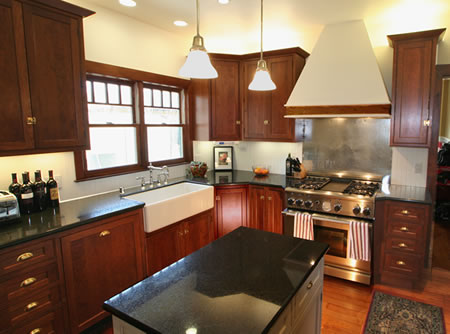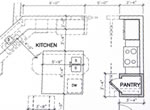Planning Kitchen Remodel Plumbing
 |
Kitchen plumbing work happens early in the remodel process. First comes demolition, then plumbing rough-in usually happens next, followed by electrical rough-in. To control costs, as with all construction projects, know what you want and need before the work starts. Changes after work starts are expensive, being well prepared can save you a lot of money in a kitchen remodel.
Knowing What You Want
You know you need water in your kitchen that is a given, but what about gas? Will you have a gas stove, oven or range? If so, you will need a gas line run to anywhere a gas appliance will be located; and plumbers are responsible for installing the gas lines. Are you undecided about whether you will want a gas appliance, maybe some day in the future you might want one? It isn't expensive to run a gas line when all the walls are already opened up; you could install one, just in case you need it in the future.
The other common users of natural gas or propane are water heaters, clothes dryers or a furnace. Will you have your main or a supplemental gas water heater, gas furnace/heater or laundry area in or adjacent to the kitchen? If so, make sure your contractor and /or plumber are aware of these utilities so they can plan for and install the proper sized gas lines.
The water line to the kitchen sink is obvious, but what about a pot filler over the stove, ice and water through door from the fridge, a separate prep sink, dishwasher, and any other appliance that can be plumbed for water? There are things like built-in coffee makers, filtered water dispensers, instant hot water taps that also need to be considered when planning the plumbing needs of the kitchen.
The plumbers will also do the rough in for drains. They need to know about any appliance that will use and drain water. Typically these are just sinks and dishwashers. But if you are doing a laundry area adjacent to the kitchen, make sure that drain lines are in the plans. Also, an island sink requires special venting in the drain line, so make sure the plan is clear if you have a sink or prep sink that is in an island or is otherwise not connected to a wall.
Another thing to consider is whether to plumb for a grey water system. Grey water systems reclaim non-sewage waste water for use for things such as yard irrigation. If you wish to reduce water consumption by reclaiming waste water, make sure your contractor is aware of this at the outset. After work starts, it will be more costly to implement.
Fire Sprinklers
One final consideration is whether you will install fire sprinklers in your home. Some communities require them, more will in the future. The kitchen is the source of many home fires, so installing sprinklers, at least in the kitchen may be a prudent plan. Again, the cost is lower when all the walls are already open. Although, fire sprinklers require their own water line, so depending upon the circumstances, there may still be other significant costs to install a system. Some insurance companies offer a discount on homeowners insurance if you have a fire sprinkler system in your home.
As is the case with all remodelling projects, it is a good idea to sit down and make notes about everything you expect to have in your new kitchen. It is so easy to overlook a detail, like adding a pot-filler. Writing everything down and adding items as they pop into your head is a great way to make sure everything you want, makes it into the finished project.
Kitchen Plumbing Product Guides
|
|
|






